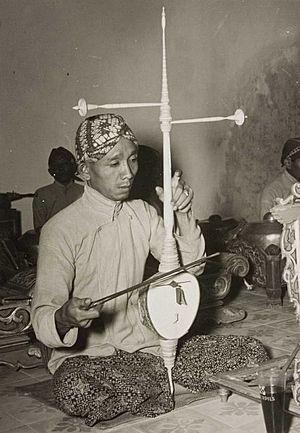K. P. H. Notoprojo facts for kids
Kanjeng Pangeran Harjo Notoprojo (born March 17, 1909 – died August 30, 2007) was a highly respected musician from Java. He was known by many names, including Tjokrowasito, Wasitodipuro, and Wasitodiningrat. He was famous for his amazing skills in playing and leading Javanese gamelan orchestras.
Notoprojo led the gamelan for the Paku Alaman palace and the Radio Republik Indonesia in Yogyakarta. He also taught gamelan at universities all over the world. Besides being a great performer, he was also a talented composer and played the rebab, a stringed instrument. In 2004, he received the Nugraha Bhakti Musik Indonesia Award for his contributions to music.
Contents
His Many Names
Notoprojo's official name changed several times during his life. Each new name showed special honors he had received.
Early Life Names
He was born in Yogyakarta, Central Java, and his birth name was Wasi Jolodoro. Later, people called him Tjokrowasito, or simply Pak Tjokro. As he became a skilled musician, his friends and fellow artists started calling him Ki Tjokrowasito. Ki is a respectful title in Java.
Palace Honors
In the 1960s, the Paku Alaman Palace honored him with the name K.R.T. Wasitodipuro. This meant "Wasito of the palace." The letters K.R.T. stood for Kanjeng Raden Tumenggung, a special title. Later, he received an even higher honor and became K.R.T. Wasitodiningrat, meaning "Wasito of the world."
A Prince's Title
In 2001, he was officially recognized as the biological son of Paku Alam VII. This made him the half-brother of Paku Alam VIII. He was then given a title similar to a prince: K. P. H. Notoprojo. K. P. H. stands for Kanjeng Pangeran Haryo. This was his name until he passed away.
His Life and Music
Notoprojo grew up in the Paku Alaman palace in Yogyakarta, Java. He started learning gamelan at just five years old. His legal father, R.W. Padmowinangum, who led the palace gamelan, was his first teacher. He also attended Taman Siswa secondary school.
Playing and Directing
Besides playing in the court gamelan, he performed with other famous groups. One such group was Daya Pradangga. He also worked as a musical director for radio stations. He directed music at MAVRO from 1934, Radio Hosokyoku during the Japanese occupation of Indonesia, and RRI Yogyakarta after Indonesia became independent.
Teaching Around the World
Starting in 1953, Notoprojo had the chance to teach karawitan (Javanese music) abroad. He taught in many different countries. He also taught at the Konservatori Tari Indonesia and Akademi Seni Tari Indonesia. He even started his own school for vocal music, called Pusat Olah Vokal Wasitodipuro.
In 1962, he took over the leadership of the Pura Pakualaman gamelan from his father. The music style of Pura Pakualaman combined traditions from the Yogyakarta Sultanate palace and the Susuhunan's palace in Solo (Surakarta). Notoprojo helped blend these styles even more, making the Pura Pakualaman music sound very much like the Solo style.
Compositions and Legacy
In the 1960s, he composed music for a new type of dance-drama called sendratari. These included the first performances at the Lara Jonggrang temple complex in Prambanan. He worked with the famous choreographer Bagong Kussudiardjo. Notoprojo wrote over 250 pieces of music. These included many light gamelan songs (lagu dolanan) and new, experimental works (kreasi baru). Many of his compositions are still very popular in gamelan music today. He also helped bring back old art forms from Yogyakarta, like wayang gedhog.
One of his recordings, "Puspawarna," was chosen for the Voyager Golden Record. This record was sent into space on the Voyager 1 spacecraft. It was meant as a greeting to any aliens who might find it! The recording is also on the album Java: Court Gamelan. Carl Sagan, a famous scientist, loved "Puspawarna."
Later Life and Return Home
Notoprojo led the gamelan at the Indonesian Pavilion during the 1964 New York World's Fair. In 1971, he moved to Valencia, California. He taught at the California Institute of the Arts until 1992. He also taught at other universities, including University of California, Berkeley and San José State University. In 1992, he retired and returned to Indonesia. His home became a place where young artists could live and learn. It was also a spot for regular performances and gatherings of Java's best gamelan artists.
He passed away in Yogyakarta on August 30, 2007. He was 104 years old by the Javanese calendar. Notoprojo played a huge role in sharing Javanese gamelan music and knowledge with the entire world. Many people believe that no other Indonesian has done as much as he did to help the world appreciate the amazing gamelan traditions of Java.
Recordings
As Performer or Director
- Javanese Court Gamelan, released by Nonesuch Records, 1971 (reissued in 2003). A part of "Puspawarna" from this album is on the Voyager Golden Record. This record was put together by Carl Sagan and others for the Voyager spacecraft.
Compositions
- The music of K.R.T. Wasitodiningrat, performed by Gamelan Sekar Tunjung, released by CMP Records, 1994.
Writings and Notation
- Javanese Vocal Notation: This is a collection of music notes for male voices (gerong) and female voices (pesindhen). It includes almost 300 pieces, written by Notoprojo himself. He wrote these notes while teaching at the California Institute of the Arts. Some of the pieces are his own compositions. You can find these notes, along with a collection of his compositions, online in the library of the American Gamelan Institute.
See also
 In Spanish: K. R. T. Wasitodiningrat para niños
In Spanish: K. R. T. Wasitodiningrat para niños
 | John T. Biggers |
 | Thomas Blackshear |
 | Mark Bradford |
 | Beverly Buchanan |


